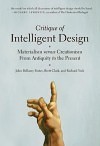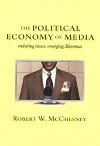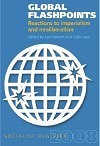United States

Critique of Intelligent Design is a direct reply to the criticisms of intelligent design proponents and a compelling account of the long debate between materialism and religion in the West. It provides an overview of the contemporary fight concerning nature, science, history, morality, and knowledge. Separate chapters are devoted to the design debate in antiquity, the Enlightenment and natural theology, Marx, Darwin, and Freud, and to current scientific debates over evolution and design. It offers empowering tools to understand and defend critical and scientific reasoning in both the natural and social sciences and society as a whole. | more…
In 2000 I agreed to become coeditor of Monthly Review along with my dear friend John Bellamy Foster. I had been reading MR since 1972 when I was a teenager and had been educated, enlightened, and inspired by it, and the work of editors Paul Sweezy and Harry Magdoff. I had introduced John to the magazine soon after I discovered it. By the 1990s I had become a regular contributor to MR. When John and Harry asked me to join them as a coeditor I initially balked. I already had a very full schedule and there was no sign it would abate. Plus, I was a media historian and critic; not an economist. But John, in particular, insisted that my involvement was necessary to bring MR through a difficult transition editorially and financially. He promised me that he would do most of the work. I agreed with an understanding that I would have to revisit the situation in due time | more…

More than any other work, The Political Economy of Media demonstrates the incompatibility of the corporate media system with a viable democratic public sphere, and the corrupt policymaking process that brings the system into existence. Among the most acclaimed communication scholars in the world, Robert W. McChesney has brought together all the major themes of his two decades of research. Rich in detail, evidence, and thoughtful arguments, The Political Economy of Media provides a comprehensive critique of the degradation of journalism, the hyper-commercialization of culture, the Internet, and the emergence of the contemporary media reform movement. The Political Economy of Media is mandatory reading for anyone wishing to understand and change media, and the political economy, in the world today. | more…
This is the fourth in a continuing series of special issues on the economy to which we have devoted the magazine each April since 2001. In the first of these, written shortly before the 2001 recession began, we took on the then prevalent myth of the “New Economy,” arguing that it was more myth than reality, and dispelling the notion that high tech and rising productivity gains had somehow tamed the business cycle. In April 2002 we dedicated the Review of the Month to examining the core economic contradictions of the system in terms of “Slow Growth, Excess Capital, and a Mountain of Debt.” Last April we asked the question, “What Recovery?” and focused on the fact that the recovery had failed to spread to employment, and on the whole problem of labor underutilization—inquiring into how the economy managed to keep going at all under these circumstances. | more…
Except in times of war, capitalist economies almost never reach full employment. The mere absence of jobs for those desiring paid employment, however, is not necessarily a problem for the ruling economic interests. Unemployment and the underutilization of labor more generally—the existence of what Marx called the industrial reserve army of labor—is a necessary part of a capitalist economy, since it keeps wages low as workers are forced to compete with each other for jobs. This becomes a serious problem for the system or for the political structure when the shortfall in employment coincides with a deeper structural crisis; when aggregate demand and thus investment opportunities are hindered by low employment and low wages; and when a shortage of jobs creates a political problem, sometimes even igniting popular opposition at the grassroots of society. All three of these contradictions are apparent in 2004, setting the stage for a national debate on the question of jobs, which more than three years since the beginning of the 2001 recession is now suddenly a front page story | more…
Doug Henwood, After the New Economy (New York: The New Press, 2003), 269 pages, hardcover $24.95.
In the late nineties, the San Francisco Bay Area was caught up in the mania of the high-tech, information-based “New Economy.” Venture capitalists threw money at e-commerce start-ups based on dicey premises, while loss-making companies raked in millions at their initial public offerings. In low income areas like the Mission District, dot-coms moved in, forcing out poor people whose only recourse was to organize themselves in anti-displacement coalitions and hope for the market to crash. In the fray, even a new type of gold digger emerged: women in search of nerdly adolescent millionaires with fat stock options. It was a stupefying time | more…

Since 1964, the Socialist Register has brought together leading writers on the left to investigate aspects of a common theme. Global Flashpoints: Reactions to Imperialism and Neoliberalism examines the distinguishing features of neoliberalism today as well as the prospects for the left in the Islamic world, in Latin America, and in the capitalist North. | more…

Contributions by John Bellamy Foster, Vincent Navarro, William K. Tabb, Michael Perelman, Richard D. Vogel, David Roediger, Kristen Lavelle and Joe Feagin, Sabiyha Prince, Martha Gimenez, Stephanie Luce and Mark Brenner, Peter McLaren and Ramin Farahmandpur, Michael D. Yates, Angela Jancius, and Michael Zweig. Edited by Michael D. Yates. | more…
The articles on imperialism in this special issue were all written in honor of Harry Magdoff’s ninetieth birthday. Most of them grew out of papers presented at the “Imperialism Today” conference organized to celebrate Harry’s life and work, held in Burlington, Vermont on May 3, 2003. The conference was from our perspective an enormous success. Penetrating analyses of the current imperial moment were presented, challenging questions came from the floor, and there were good discussions and good cheer all around—despite the grim turn of world events that needed to be confronted. In the reception at the end of the day U.S. Representative Bernie Sanders (Independent-Vermont), spoke of Harry’s achievement. As the conference participants gathered around he declared that | more…
The chief, indeed the only, justification that Washington offered for its invasion of Iraq during its build-up for war between September 2002 and March 2003,was the need to “disarm” an Iraqi regime that Washington contended had broken UN resolutions banning weapons of mass destruction in that country. The problem, though, was that there was no hard evidence that Iraq, which had effectively destroyed its weapons of mass destruction in the 1990s under UN supervision, had any such weapons—or if it did that they were functional and constituted a significant threat. Nevertheless, the Bush administration continued to insist (based on speculation, hearsay, and what turned out to be fabricated evidence) that Iraq had such banned weapons in significant quantities and was actually deploying them. In an extraordinary propaganda campaign in which the whole mainstream media took part, the U.S. population was led to believe that they were in imminent danger of attack from these phantom weapons and had no choice but to support a pre-emptive invasion of that country | more…
Truth and conscience, and with them art, are the first casualties of any war. The impending U.S. invasion of Iraq has already provided us with two major examples of this. The first of these was the cancellation by First Lady Laura Bush of a White House Symposium on “Poetry and the American Voice” scheduled for early February 2003, once it was discovered that some of the invited poets were voicing opposition to Bush administration plans for an invasion of Iraq and might use the occasion to address the conscience of the country on the war. (Upon receiving the White House invitation, as explained in this issue, Sam Hamill, founding editor and co-founder of Copper Canyon Press, issued a call for the establishment of Poets Against the War. His call was answered by thousands of poets, including many of the country’s leading literary figures, who offered their antiwar poems. Some of this poetry protesting the impending war is printed for the first time in this issue of MR.) | more…

The road trip is a staple of modern American literature. But nowhere in American literature, until now, has an economist hit the road, observing and interpreting the extraordinary range and spectacle of U.S. life, bringing out its conflicts and contradictions with humor and insight. | more…




